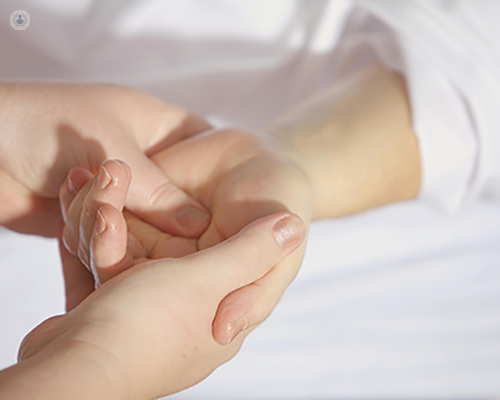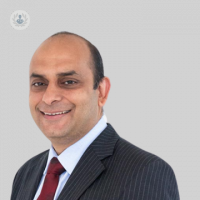Carpal tunnel syndrome: Causes, symptoms, management
Written in association with:Carpal tunnel syndrome (CTS) is a prevalent condition impacting numerous individuals, especially those involved in repetitive hand and wrist activities.
In his latest online article, Mr Arvind Mohan, renowned consultant orthopaedic shoulder, elbow, hand and wrist surgeon, aims to provide a comprehensive overview of CTS, including its symptoms, causes, and treatment options. If you suspect you may have CTS, it is important to seek medical advice promptly.

What is carpal tunnel syndrome?
Carpal tunnel syndrome arises when the median nerve, which travels from the forearm to the palm, becomes compressed or pinched at the wrist. The carpal tunnel is a narrow, rigid passageway of ligament and bones at the base of the hand, housing the median nerve and several tendons. When this tunnel narrows or the tissues surrounding the flexor tendons swell, they press on the median nerve, causing CTS.
Symptoms of carpal tunnel syndrome
CTS symptoms often start gradually and can worsen over time. Common symptoms include:
- Tingling or numbness: Many people experience tingling or numbness in their thumb, index, and middle fingers. This sensation may occur while holding a steering wheel, phone, or newspaper and may even wake you from sleep.
- Pain and discomfort: Pain can extend from your wrist up your arm to your shoulder or down into your palm and fingers.
- Weakness: You might drop objects more frequently or have a weakened grip due to the affected muscles controlled by the median nerve.
Causes and risk factors
Various factors can lead to the development of CTS:
- Repetitive hand use: Activities involving repetitive motion of the wrist can aggravate the tendons, leading to swelling and increased pressure on the median nerve.
- Anatomy: Some people have a smaller carpal tunnel, which predisposes them to CTS.
- Health conditions: Conditions such as diabetes, rheumatoid arthritis, and thyroid gland imbalance can increase the risk of CTS.
- Gender: CTS is more common in women, possibly due to smaller carpal tunnel areas.
Diagnosis
A thorough physical examination and detailed medical history are crucial for diagnosing CTS. Tests such as the Tinel's sign (tapping over the median nerve to elicit tingling) and Phalen's maneuver (flexing the wrist to reproduce symptoms) are often performed. Nerve conduction studies may also be conducted to assess the severity of the condition.
Treatment options
Treatment for CTS varies depending on the severity of the condition:
- Non-surgical treatments: For mild to moderate symptoms, wrist splinting, especially at night, can help keep the wrist in a neutral position, reducing pressure on the median nerve. Non-steroidal anti-inflammatory drugs (NSAIDs) can relieve pain and swelling. Corticosteroid injections can also be administered to reduce inflammation.
- Surgical treatments: If symptoms are severe or do not improve with non-surgical treatments, surgery might be necessary. The goal of carpal tunnel release surgery is to relieve pressure by cutting the ligament pressing on the median nerve.
Preventive measures
While not all cases of CTS can be prevented, some measures can reduce the risk:
- Take breaks: If your work involves repetitive hand and wrist motions, take regular breaks to stretch and flex your hands and wrists.
- Ergonomic adjustments: Adjust your workstation, so your hands and wrists are in a neutral position. Use ergonomic tools and equipment to minimise strain.
- Strengthening exercises: Strengthening and stretching exercises for the hand and wrist can help maintain flexibility and reduce the risk of CTS.
Mr Arvind Mohan is an esteemed orthopaedic shoulder, elbow, hand & wrist surgeon. You can schedule an appointment with Mr Mohan on his Top Doctors profile.


